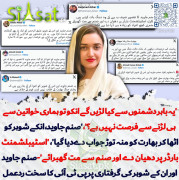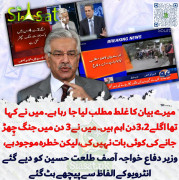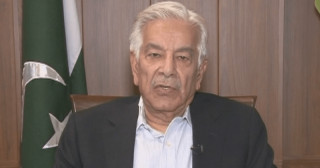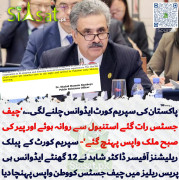mehwish_ali
Chief Minister (5k+ posts)
قرآنی ترجمے میں تحریف
Allah says in the Holy Quran Chapter 17 Surah Al-Isra (سورة الإسراء) verse 57:
Those whom they call upon do desire (for themselves) means of access to their Lord, - even those who are nearest: they hope for His Mercy and fear His Wrath: for the Wrath of thy Lord is something to take heed of.أُولَـٰئِكَ الَّذِينَ يَدْعُونَ يَبْتَغُونَ إِلَىٰ رَبِّهِمُ الْوَسِيلَةَ أَيُّهُمْ أَقْرَبُ وَيَرْجُونَ رَحْمَتَهُ وَيَخَافُونَ عَذَابَهُ ۚ إِنَّ عَذَابَ رَبِّكَ كَانَ مَحْذُورًا
وہ لوگ جنہیں یہ پکارتے ہیں جو ان میں سے زیادہ مقرب ہیں وہ بھی اپنے رب کی طرف نیکیوں کا ذریعہ تلاش کرتے ہیں اور اس کی مہربانی کی امید رکھتے ہیں اور اس کے عذاب سے ڈرتے ہیں بےشک تیرے رب کا عذاب ڈرنے کی چیز ہے
اس آیت مبارکہ کا اصل ترجمہ یہ ہے (قوسین میں لکھے گئے الفاظ مفہوم واضح کرنے کے لیے ہیں):۔
[القران 17:57] أُولَـئِكَ الَّذِينَ يَدْعُونَ يَبْتَغُونَ إِلَى رَبِّهِمُ الْوَسِيلَةَ أَيُّهُمْ أَقْرَبُ وَيَرْجُونَ رَحْمَتَهُ وَيَخَافُونَ عَذَابَهُ إِنَّ عَذَابَ رَبِّكَ كَانَ مَحْذُورًا
ترجمہ: اور وہ لوگ جنہیں یہ پکارتے (پوجتے) ہیں (یعنی ملائکہ، جنات، عیسیٰ و مریم اور عزیز علیہما السلام وغیرہ)، وہ تو خود اپنے رب کی طرف وسیلہ ڈھونڈتے ہیں کہ کون ان میں سے (شفاعت کرنے والا) (اللہ کی بارگاہ میں) زیادہ قریب ہے اور وہ خود اس کی رحمت کے امیدوار ہیں اور (وہ خود) اس کے عذاب سے ڈرتے ہیں، بیشک آپ کے رب کا عذاب ڈرنے کی چیز ہے۔
اس آیتِ مبارکہ میں اللہ تعالیٰ نے دو ایسی چیزیں کھل کر ذکر کر دی ہیں کہ جو اہلحدیث حضرات کو تاقیامت ہضم نہیں ہو سکتیں۔
مسئلے کا مختصر بیان
یہاں دو سوال اٹھتے ہیں:
تو پہلا مسئلہ کہ ان حضرات کو تحریف کی یہ ضرورت کیوں پیش آئی، تو اسکی وجہ یہ ہے کہ ان حضرات کا عقیدہ ہے کہ وسیلہ "صرف اور صرف انسان کے اپنے نیک اعمال ہیں"۔ چنانچہ رسول (ص) اور اللہ کے دیگر برگزیدہ بندوں اور فرشتوں کی شفاعت کو یہ وسیلہ تسلیم نہیں کرتے۔
چونکہ قران کی یہ آیت براہ راست اہلحدیث حضرات کے عقائد کو غلط ثابت کر رہی ہے، اس لیے ان حضرات کے پاس اسکے سوا کوئی اور راستہ نہیں رہ گیا کہ وہ اس آیت کے ترجمے و تفسیر میں تحریف کر دیں تاکہ وسیلے کے متعلق انکا خود ساختہ عقیدہ قائم رہ سکے۔
اور دوسرا مسئلہ یہ ہے کہ ہم سمجھیں کہ ان حضرات نے اس ترجمے میں کیا تحریف کی ہے۔
سعودیہ میں شاہ فہد نے قران کا جو اردو ترجمہ شائع کروایا ہے (جسکے مترجم جونا گڑھی صاحب ہیں)، اس میں انہوں نے اس آیت کے ترجمے میں تحریف کرتے ہوئے یوں کر دیا ہے:
[جوناگڑھی 17:57] جنہیں یہ لوگ پکارتے ہیں خود وہ اپنے رب کے تقرب کی جستجو میں رہتے ہیں کہ ان میں سے کون [اپنے نیک اعمال کی بدولت] زیادہ نزدیک ہو جائے وہ خود اسکی رحمت کی امید رکھتے ہیں اور اسکے عذاب سے خوفزدہ رہتے ہیں۔
چنانچہ اس آیت کے ٹکڑے "ایھم اقرب" کا ترجمہ انہوں نے کر دیا ہے "ان میں سے کون اللہ کے زیادہ نزدیک ہو جائے"۔ یعنی ان فوت شدہ انبیاء میں یہ مقابلہ لگا ہوا ہے کہ قبروں میں اپنی عبادت کے نیک عمل کے ذریعے ایک دوسرے کی نسبت اللہ کے زیادہ قریب ہو جائیں۔ (دیکھئیے اس عقیدے کے عالم دین "قریب اللہ صاحب" کا انگریزی ترجمہ، جو ہم آگے نقل کریں گے اور اس میں آپ کو یہ ذرا کھل کر نظر آ جائے گا اور یہ حضرات انٹرنیٹ پر اپنے انگلش آرٹیکلز کے لیے قریب اللہ کا یہی ترجمہ استعمال کر رہے ہیں)۔
تو ان حضرات نے آیت کے اس ٹکڑے "ایھم اقرب" کے ترجمے میں تحریف کر کے اسکو اپنے عقیدے کے مطابق ڈھال لیا ہے۔
"ایھم اقرب" کا صحیح ترجمہ
آئیے اب "ایھم اقرب" کے صحیح ترجمے کا ان حضرات کے ترجمے سے تقابل کرتے ہیں:
صحیح ترجمہ:
"ایھم" ۔۔۔ کون ان میں سے
"اقرب" ۔۔۔ قریب ترین ہے (نوٹ: "ہے" زمانہ حال کا صیغہ ہے جسے انگریزی میں "پریزنٹ سمپل" کہتے ہیں۔
ان حضرات نے اس "ہے" کو فعل زمانہ مستقبل میں تبدیل کر کے یہ ساری تحریف کی ہے
عربی قواعد کی ترکیب ذرا مختلف ہے اور اسکا ذکر ہم بعد میں تفصیل سے کریں گے اور ثابت کریں گے کہ اہلحدیث ترجمہ یقینی طور پر غلط ہے۔ انشاء اللہ۔)
ان حضرات کا ترجمہ:
"ایھم" ۔۔۔ ان میں سے کون
"اقرب" ۔۔۔ زیادہ نزدیک ہو جائے ("ہو جانا" زمانہ مستقبل کا صیغہ ہے اور یہ تحریف کر کے ان حضرات یہ ثابت کرنا چاہتے ہیں کہ "ان میں سے کون [اپنی قبر میں کی گئی عبادات کو وسیلہ بنا کر] زیادہ نزدیک ہو جائے۔)
بات بہت نازک ہے اور بہت چالاکی سے یہ تحریف کی گئی ہے۔ ہماری قارئین سے درخواست ہے کہ وہ بہت توجہ سے اس بحث کو پڑھتے جائیں اور ہم بہت گہرائی میں جا کر ہر زاویے سے اس غلط ترجمے کی تحریف کو اللہ تعالیٰ کی مدد سے واضح کریں گے۔ انشاء اللہ۔
چند وہ علماء جنہوں نے صحیح ترجمہ کیا
اب قبل اسکے کہ ہم "ایھم اقرب" کے صحیح ترجمے پر بحث کو آگے بڑھائیں، بہتر ہے کہ چند صحیح تراجم کو دیکھ لیا جائے۔
[القران 17:57] أُولَـئِكَ الَّذِينَ يَدْعُونَ يَبْتَغُونَ إِلَى رَبِّهِمُ الْوَسِيلَةَ أَيُّهُمْ أَقْرَبُ وَيَرْجُونَ رَحْمَتَهُ وَيَخَافُونَ عَذَابَهُ إِنَّ عَذَابَ رَبِّكَ كَانَ مَحْذُورًا
[احمد رضا 17:57] وہ مقبول بندے جنہیں یہ کافر پوجتے ہیں وہ آپ ہی اپنے رب کی طرف وسیلہ ڈھونڈتے ہیں کہ ان میں کون زیادہ مقرب ہے اس کی رحمت کی امید رکھتے اور اس کے عذاب سے ڈرتے ہیں بیشک تمہارے رب کا عذاب ڈر کی چیز ہے
[طاہر القادری 17:57] یہ لوگ جن کی عبادت کرتے ہیں (یعنی ملائکہ، جنّات، عیسٰی اور عزیر علیہما السلام وغیرھم کے بت اور تصویریں بنا کر انہیں پوجتے ہیں) وہ (تو خود ہی) اپنے رب کی طرف وسیلہ تلاش کرتے ہیں کہ ان میں سے (بارگاہِ الٰہی میں) زیادہ مقرّب کون ہے اور (وہ خود) اس کی رحمت کے امیدوار ہیں اور (وہ خود ہی) اس کے عذاب سے ڈرتے رہتے ہیں، (اب تم ہی بتاؤ کہ وہ معبود کیسے ہو سکتے ہیں وہ تو خود معبودِ برحق کے سامنے جھک رہے ہیں)، بیشک آپ کے رب کا عذاب ڈرنے کی چیز ہے
[محمود الحسن دیوبندی 17:57] وہ لوگ جن کو یہ پکارتے ہیں وہ خود ڈھونڈتے ہیں اپنے رب تک وسیلہ کہ کونسا بندہ بہت نزدیک ہے۔ اور امید رکھتے ہیں اسکی مہربانی کی اور ڈرتے ہیں اسکے عذاب سے۔ بے شک تیرے رب کا عذاب ڈرنے کی چیز ہے۔
تفسیر از شبیر احمد عثمانی (مکتب دیوبند):
۔۔۔ مطلب یہ ہے کہ جن ہستیوں کو تم معبود و مستعان سمجھ کر پکارتے ہو، وہ خود اپنے رب کا بیش از بیش قرب تلاش کرتے ہیں۔ ان کی دوا دوش صرف اس لیے ہے کہ خدا کی نزدیکی ھاصل کرنے میں کون آگے نکلتا ہے، ان میں جو زیادہ مقرب ہیں وہ ہی زیادہ قرب الہی کے طالب رہتے ہیں اور سوچتے ہیں کہ کسی سب سے زیادہ مقرب بندہ کی دعاء وغیرہ کو حصولِ قرب کا وسیلہ بنائیں۔
[پیر کرم الازھری 17:57] وہ لوگ جنہیں یہ مشرک پکارا کرتے ہیں وہ خود ڈھونڈتے ہیں اپنے رب کی طرف وسیلہ کہ کونسا بندہ (اللہ سے) زیادہ قریب ہے اور امید رکھتے ہیں اللہ کی رحمت کی اور ڈرتے رہتے ہیں اسکے عذاب سے۔
[تفسیر از پیر کرم الازھری] مطلب یہ ہے کہ کمشرکین جن کو خدا بنائے ہوئے ہیں اور جن کو اپنی تکالیف و مصائب میں پکارتے ہیں یہ خدا نہیں بلکہ وہ تو خود ہر لمحہ ہر لحظہ اپنے رب کریم کی خوشنودی حاصل کرنے کے لیے مصروفِ عمل رہتے ہیں۔ اگر واقعی وہ خدا ہوتے جیسے مشرکین کا خیال ہے تو پھر انہیں کسی کی عبادت اور رضاجوئی کی کیا ضرورت تھی۔ مسئلہ: اس سے معلوم ہوا کہ مقرب بندوں کو بارگاہ الہی میں وسیلہ بنانا جائز ہے اور اللہ تعالی کے مقبول بندوں کا طریقہ ہے۔ اس آیت میں غور کرنے سے معلوم ہوتا ہے کہ کسی غیر کی عبادت کرنا ممنوع ہے لیکن مقبولانِ بارگاہ ایزدی کا وسیلہ پکڑنا اور انس ے التماسِ دعا کرنا جائز ہے ۔
عربی قواعد کے مطابق "ایھم اقرب" کا ترجمہ
پہلی بات جو آپ نوٹ کریں وہ یہ ہے کہ "ایھم اقرب" میں کوئی "فعل" کا صیغہ استعمال نہیں ہوا ہے۔ چنانچہ عربی زبان کے لحاظ سے اس میں "فعل حال" یا "فعل مستقبل" کا کوئی بحث ہی نہیں ہے۔
عربی زبان میں "جملہ" کی دو اقسام ہوتی ہیں:
1) الجملات الفعلیۃ
("فعلیہ جملے" یعنی Verbal Sentence )
2) الجملات الاسمیہ
("اسمیہ جملے" یعنی Noun Senteces )
عربی میں جملے کے ان اقسام کی مثال اردو یا انگریزی زبان میں نہیں مل سکتی۔ "فعلیہ جملے" وہ ہوتے ہیں جو کسی "فعل" سے شروع ہوتے ہیں جبکہ "اسمیہ جملے" وہ ہوتے ہیں جو کسی "اسم" سے شروع ہوتے ہیں۔ اب یہ چیز عربی زبان میں بالکل قابل قبول ہے (بلکہ کچھ صورتوں میں بہتر ہے) کہ فعل "ہے" کو جملے سے نکال دیا جائے۔ مثال کے طور پر عربی زبان میں یہ کہنا بالکل درست ہو گا: "الکتاب کبیر"، جسکا مطلب ہے "یہ بڑی کتاب ہے"۔
آپ یہ بھی کہہ سکتے ہیں "یکن الکتاب کبیرا" جس میں آپ "یکن" کا فعل استعمال کر رہے ہیں جسکا مطلب ہے "ہے"۔ مگر یہ ناخوشگوار عربی ہے اور یہ بہتر طریقہ ہے کہ "یکن" کو نکال دیا جائے اور صرف "الکتاب کبیر" کہا جائے۔ اب اوپر کی آیت میں "ایھم اقرب" بالکل اسی طرح کا جملہ ہے، یعنی کسی بھی "فعل" کے بغیر اور اسی لیے اسکے ترجمہ کرتے ہوئے ہمیں "ہے" استعمال کرنا ہو گا۔
چنانچہ "الکتاب کبیر" کا ترجمہ ہم "یہ ایک بڑی کتاب ہے" کریں گے بجائے اسکے کہ یہ کہیں "یہ ایک بڑی کتاب ہو جائے"۔ چنانچہ اہلحدیث ترجمہ "ہو جائے" ہر صورت میں غلط ہے۔
اگر "ایھم اقرب" کے اس جملے میں کوئی "فعل" استعمال ہو جاتا تو زمانہ حال یا زمانہ مستقبل کے متعلق شاید کچھ غلط فہمی ہو جاتی، مگر اس سلسلے تو سرے سے کسی غلط فہمی کی گنجائش ہی نہیں ہے۔
چنانچہ "ای" کا مطلب ہے "ان میں سے" اور "اقرب" کا مطلب ہے "قریب ترین"، یعنی "ان میں سے کون قریب ترین ہے"۔
اب حضرات کو چیلنج ہے کہ وہ اس جملے کا ترجمہ "قریب ہو جائے" ثابت کریں۔
سورۃ النساء کی آیت 11 میں "ایھم اقرب" کا ترجمہ
اللہ تعالیٰ کا شکر ہے کہ اُس نے پہلے سے ہی خود یہ انتظام کر کے رکھا ہوا ہے کہ ترجمے میں غلطی صاف پکڑی جائے۔ اور یہ انتظام ایسے کیا کہ یہی جملہ "ایھم اقرب" اللہ تعالی نے سورۃ النساء کی آیت 11 میں استعمال کیا ہے۔
[القران 4:11] ۔۔۔آبَآؤُكُمْ وَأَبْنَاؤُكُمْ لاَ تَدْرُونَ أَيُّهُمْ أَقْرَبُ
اللہ کا شکر ہے کہ اُس کے انتظام کے باعث اب یہاں آ کر اہلحدیث عقائد رکھنے والے تمام مترجمین پکڑے گئے اور اِن سب نے یہاں "ایھم اقرب" کا ترجمہ "جو ان میں سے قریب ترین ہے" کیا۔ ذیل میں دیکھئیے یہ تمام تراجم:
[جوناگڑھی 4:11] ۔۔۔ تمہارے باپ ہوں یا تمہارے بیٹے تمہیں نہیں معلوم کہ ان میں سے کون تمہیں نفع پہنچانے میں زیادہ قریب ہے۔
[مودودی 4:11] ۔۔۔ تم نہیں جانتے کہ تمہارے ماں باپ اور تمہاری اولاد میں سے کون بلحاظ نفع تم سے قریب تر ہے۔
[قران آسان تحریک (شبیر احمد) 4:11] ۔۔۔ تمہارے ماں باپ اور تمہاری اولاد، نہیں جانتے تم کہ کون ان میں سے قریب تر ہے
[احمد علی 4:11] ۔۔۔ تمہارے باپوں اور تمہارے بیٹوں میں سے کون تمہیں زیادہ نفع پہنچانے والا ہے
غرض، یہاں آپ جس مرضی مترجم کا ترجمہ لے لیں، اُس نے "ایھم اقرب" کا ترجمہ "ان میں سے جو قریب ترین ہے" ہی کیا ہے اور صرف سورۃ بنی اسرائیل کی سترھویں آیت کا ترجمہ کرتے ہوئے ان حضرات کو "فعل مستقبل" کی بیماری لاحق ہو گئی ہے اور یہ جانتے بوجھتے اس تحریف کے مرتکب ہو رہے ہیں (بلکہ یہ اس معنوی تحریف پر مجبور ہیں کیونکہ قران پاک کی صرف یہ ایک آیت ان کے عقائد کا مکمل گلا کاٹ رہی ہے)۔
[القران 17:57] أُولَـئِكَ الَّذِينَ يَدْعُونَ يَبْتَغُونَ إِلَى رَبِّهِمُ الْوَسِيلَةَ أَيُّهُمْ أَقْرَبُ وَيَرْجُونَ رَحْمَتَهُ وَيَخَافُونَ عَذَابَهُ إِنَّ عَذَابَ رَبِّكَ كَانَ مَحْذُورًا
ترجمہ: اور وہ لوگ جنہیں یہ پکارتے (پوجتے) ہیں (یعنی ملائکہ، جنات، عیسیٰ و مریم اور عزیز علیہما السلام وغیرہ)، وہ تو خود اپنے رب کی طرف وسیلہ ڈھونڈتے ہیں کہ کون ان میں سے (شفاعت کرنے والا) (اللہ کی بارگاہ میں) زیادہ قریب ہے اور وہ خود اس کی رحمت کے امیدوار ہیں اور (وہ خود) اس کے عذاب سے ڈرتے ہیں، بیشک آپ کے رب کا عذاب ڈرنے کی چیز ہے۔
اس آیتِ مبارکہ میں اللہ تعالیٰ نے دو ایسی چیزیں کھل کر ذکر کر دی ہیں کہ جو اہلحدیث حضرات کو تاقیامت ہضم نہیں ہو سکتیں۔
- پہلا یہ کہ اس آیت میں اللہ تعالیٰ اپنے برگزیدہ انبیاء و ملائکہ کا ذکر کر رہا ہے جو اللہ کے قریب پہنچنے کے لیے اپنے میں سے "زیادہ بزرگ" اور "زیادہ مقرب" کا "وسیلہ" پکڑتے ہیں تاکہ اس زیادہ مقرب وسیلے کی شفاعت سے اللہ کے اور قریب پہنچ سکیں۔
- دوسرا یہ کہ یہ آیت یہ بھی بیان کر رہی ہے کہ اللہ کے یہ مقرب انبیاء "اپنی وفات" کے بعد بھی بزرگی میں اپنے برتر انبیاء کا وسیلہ ڈھونڈتے ہیں (اور بزرگی میں اللہ کے نزدیک تر یہ انبیاء بھی (کہ جنکا وسیلہ پکڑا جا رہا ہے) اگرچہ کہ"وفات" پا چکے ہیں، مگر انکی وفات اس چیز میں مانع نہیں کہ وہ انکی شفاعت کریں)۔
مسئلے کا مختصر بیان
یہاں دو سوال اٹھتے ہیں:
- پہلا یہ کہ انہیں ترجمے میں یہ تحریف کرنے کی کیوں ضرورت پیش آئی؟
- دوسرا یہ کہ انہوں نے اس آیت کا جو ترجمہ کیا ہے، اُس میں وہ تحریفی الفاظ کیا ہیں؟
تو پہلا مسئلہ کہ ان حضرات کو تحریف کی یہ ضرورت کیوں پیش آئی، تو اسکی وجہ یہ ہے کہ ان حضرات کا عقیدہ ہے کہ وسیلہ "صرف اور صرف انسان کے اپنے نیک اعمال ہیں"۔ چنانچہ رسول (ص) اور اللہ کے دیگر برگزیدہ بندوں اور فرشتوں کی شفاعت کو یہ وسیلہ تسلیم نہیں کرتے۔
چونکہ قران کی یہ آیت براہ راست اہلحدیث حضرات کے عقائد کو غلط ثابت کر رہی ہے، اس لیے ان حضرات کے پاس اسکے سوا کوئی اور راستہ نہیں رہ گیا کہ وہ اس آیت کے ترجمے و تفسیر میں تحریف کر دیں تاکہ وسیلے کے متعلق انکا خود ساختہ عقیدہ قائم رہ سکے۔
اور دوسرا مسئلہ یہ ہے کہ ہم سمجھیں کہ ان حضرات نے اس ترجمے میں کیا تحریف کی ہے۔
سعودیہ میں شاہ فہد نے قران کا جو اردو ترجمہ شائع کروایا ہے (جسکے مترجم جونا گڑھی صاحب ہیں)، اس میں انہوں نے اس آیت کے ترجمے میں تحریف کرتے ہوئے یوں کر دیا ہے:
[جوناگڑھی 17:57] جنہیں یہ لوگ پکارتے ہیں خود وہ اپنے رب کے تقرب کی جستجو میں رہتے ہیں کہ ان میں سے کون [اپنے نیک اعمال کی بدولت] زیادہ نزدیک ہو جائے وہ خود اسکی رحمت کی امید رکھتے ہیں اور اسکے عذاب سے خوفزدہ رہتے ہیں۔
چنانچہ اس آیت کے ٹکڑے "ایھم اقرب" کا ترجمہ انہوں نے کر دیا ہے "ان میں سے کون اللہ کے زیادہ نزدیک ہو جائے"۔ یعنی ان فوت شدہ انبیاء میں یہ مقابلہ لگا ہوا ہے کہ قبروں میں اپنی عبادت کے نیک عمل کے ذریعے ایک دوسرے کی نسبت اللہ کے زیادہ قریب ہو جائیں۔ (دیکھئیے اس عقیدے کے عالم دین "قریب اللہ صاحب" کا انگریزی ترجمہ، جو ہم آگے نقل کریں گے اور اس میں آپ کو یہ ذرا کھل کر نظر آ جائے گا اور یہ حضرات انٹرنیٹ پر اپنے انگلش آرٹیکلز کے لیے قریب اللہ کا یہی ترجمہ استعمال کر رہے ہیں)۔
تو ان حضرات نے آیت کے اس ٹکڑے "ایھم اقرب" کے ترجمے میں تحریف کر کے اسکو اپنے عقیدے کے مطابق ڈھال لیا ہے۔
"ایھم اقرب" کا صحیح ترجمہ
آئیے اب "ایھم اقرب" کے صحیح ترجمے کا ان حضرات کے ترجمے سے تقابل کرتے ہیں:
صحیح ترجمہ:
"ایھم" ۔۔۔ کون ان میں سے
"اقرب" ۔۔۔ قریب ترین ہے (نوٹ: "ہے" زمانہ حال کا صیغہ ہے جسے انگریزی میں "پریزنٹ سمپل" کہتے ہیں۔
ان حضرات نے اس "ہے" کو فعل زمانہ مستقبل میں تبدیل کر کے یہ ساری تحریف کی ہے
عربی قواعد کی ترکیب ذرا مختلف ہے اور اسکا ذکر ہم بعد میں تفصیل سے کریں گے اور ثابت کریں گے کہ اہلحدیث ترجمہ یقینی طور پر غلط ہے۔ انشاء اللہ۔)
ان حضرات کا ترجمہ:
"ایھم" ۔۔۔ ان میں سے کون
"اقرب" ۔۔۔ زیادہ نزدیک ہو جائے ("ہو جانا" زمانہ مستقبل کا صیغہ ہے اور یہ تحریف کر کے ان حضرات یہ ثابت کرنا چاہتے ہیں کہ "ان میں سے کون [اپنی قبر میں کی گئی عبادات کو وسیلہ بنا کر] زیادہ نزدیک ہو جائے۔)
بات بہت نازک ہے اور بہت چالاکی سے یہ تحریف کی گئی ہے۔ ہماری قارئین سے درخواست ہے کہ وہ بہت توجہ سے اس بحث کو پڑھتے جائیں اور ہم بہت گہرائی میں جا کر ہر زاویے سے اس غلط ترجمے کی تحریف کو اللہ تعالیٰ کی مدد سے واضح کریں گے۔ انشاء اللہ۔
چند وہ علماء جنہوں نے صحیح ترجمہ کیا
اب قبل اسکے کہ ہم "ایھم اقرب" کے صحیح ترجمے پر بحث کو آگے بڑھائیں، بہتر ہے کہ چند صحیح تراجم کو دیکھ لیا جائے۔
[القران 17:57] أُولَـئِكَ الَّذِينَ يَدْعُونَ يَبْتَغُونَ إِلَى رَبِّهِمُ الْوَسِيلَةَ أَيُّهُمْ أَقْرَبُ وَيَرْجُونَ رَحْمَتَهُ وَيَخَافُونَ عَذَابَهُ إِنَّ عَذَابَ رَبِّكَ كَانَ مَحْذُورًا
[احمد رضا 17:57] وہ مقبول بندے جنہیں یہ کافر پوجتے ہیں وہ آپ ہی اپنے رب کی طرف وسیلہ ڈھونڈتے ہیں کہ ان میں کون زیادہ مقرب ہے اس کی رحمت کی امید رکھتے اور اس کے عذاب سے ڈرتے ہیں بیشک تمہارے رب کا عذاب ڈر کی چیز ہے
[طاہر القادری 17:57] یہ لوگ جن کی عبادت کرتے ہیں (یعنی ملائکہ، جنّات، عیسٰی اور عزیر علیہما السلام وغیرھم کے بت اور تصویریں بنا کر انہیں پوجتے ہیں) وہ (تو خود ہی) اپنے رب کی طرف وسیلہ تلاش کرتے ہیں کہ ان میں سے (بارگاہِ الٰہی میں) زیادہ مقرّب کون ہے اور (وہ خود) اس کی رحمت کے امیدوار ہیں اور (وہ خود ہی) اس کے عذاب سے ڈرتے رہتے ہیں، (اب تم ہی بتاؤ کہ وہ معبود کیسے ہو سکتے ہیں وہ تو خود معبودِ برحق کے سامنے جھک رہے ہیں)، بیشک آپ کے رب کا عذاب ڈرنے کی چیز ہے
[محمود الحسن دیوبندی 17:57] وہ لوگ جن کو یہ پکارتے ہیں وہ خود ڈھونڈتے ہیں اپنے رب تک وسیلہ کہ کونسا بندہ بہت نزدیک ہے۔ اور امید رکھتے ہیں اسکی مہربانی کی اور ڈرتے ہیں اسکے عذاب سے۔ بے شک تیرے رب کا عذاب ڈرنے کی چیز ہے۔
تفسیر از شبیر احمد عثمانی (مکتب دیوبند):
۔۔۔ مطلب یہ ہے کہ جن ہستیوں کو تم معبود و مستعان سمجھ کر پکارتے ہو، وہ خود اپنے رب کا بیش از بیش قرب تلاش کرتے ہیں۔ ان کی دوا دوش صرف اس لیے ہے کہ خدا کی نزدیکی ھاصل کرنے میں کون آگے نکلتا ہے، ان میں جو زیادہ مقرب ہیں وہ ہی زیادہ قرب الہی کے طالب رہتے ہیں اور سوچتے ہیں کہ کسی سب سے زیادہ مقرب بندہ کی دعاء وغیرہ کو حصولِ قرب کا وسیلہ بنائیں۔
[پیر کرم الازھری 17:57] وہ لوگ جنہیں یہ مشرک پکارا کرتے ہیں وہ خود ڈھونڈتے ہیں اپنے رب کی طرف وسیلہ کہ کونسا بندہ (اللہ سے) زیادہ قریب ہے اور امید رکھتے ہیں اللہ کی رحمت کی اور ڈرتے رہتے ہیں اسکے عذاب سے۔
[تفسیر از پیر کرم الازھری] مطلب یہ ہے کہ کمشرکین جن کو خدا بنائے ہوئے ہیں اور جن کو اپنی تکالیف و مصائب میں پکارتے ہیں یہ خدا نہیں بلکہ وہ تو خود ہر لمحہ ہر لحظہ اپنے رب کریم کی خوشنودی حاصل کرنے کے لیے مصروفِ عمل رہتے ہیں۔ اگر واقعی وہ خدا ہوتے جیسے مشرکین کا خیال ہے تو پھر انہیں کسی کی عبادت اور رضاجوئی کی کیا ضرورت تھی۔ مسئلہ: اس سے معلوم ہوا کہ مقرب بندوں کو بارگاہ الہی میں وسیلہ بنانا جائز ہے اور اللہ تعالی کے مقبول بندوں کا طریقہ ہے۔ اس آیت میں غور کرنے سے معلوم ہوتا ہے کہ کسی غیر کی عبادت کرنا ممنوع ہے لیکن مقبولانِ بارگاہ ایزدی کا وسیلہ پکڑنا اور انس ے التماسِ دعا کرنا جائز ہے ۔
عربی قواعد کے مطابق "ایھم اقرب" کا ترجمہ
پہلی بات جو آپ نوٹ کریں وہ یہ ہے کہ "ایھم اقرب" میں کوئی "فعل" کا صیغہ استعمال نہیں ہوا ہے۔ چنانچہ عربی زبان کے لحاظ سے اس میں "فعل حال" یا "فعل مستقبل" کا کوئی بحث ہی نہیں ہے۔
عربی زبان میں "جملہ" کی دو اقسام ہوتی ہیں:
1) الجملات الفعلیۃ
("فعلیہ جملے" یعنی Verbal Sentence )
2) الجملات الاسمیہ
("اسمیہ جملے" یعنی Noun Senteces )
عربی میں جملے کے ان اقسام کی مثال اردو یا انگریزی زبان میں نہیں مل سکتی۔ "فعلیہ جملے" وہ ہوتے ہیں جو کسی "فعل" سے شروع ہوتے ہیں جبکہ "اسمیہ جملے" وہ ہوتے ہیں جو کسی "اسم" سے شروع ہوتے ہیں۔ اب یہ چیز عربی زبان میں بالکل قابل قبول ہے (بلکہ کچھ صورتوں میں بہتر ہے) کہ فعل "ہے" کو جملے سے نکال دیا جائے۔ مثال کے طور پر عربی زبان میں یہ کہنا بالکل درست ہو گا: "الکتاب کبیر"، جسکا مطلب ہے "یہ بڑی کتاب ہے"۔
آپ یہ بھی کہہ سکتے ہیں "یکن الکتاب کبیرا" جس میں آپ "یکن" کا فعل استعمال کر رہے ہیں جسکا مطلب ہے "ہے"۔ مگر یہ ناخوشگوار عربی ہے اور یہ بہتر طریقہ ہے کہ "یکن" کو نکال دیا جائے اور صرف "الکتاب کبیر" کہا جائے۔ اب اوپر کی آیت میں "ایھم اقرب" بالکل اسی طرح کا جملہ ہے، یعنی کسی بھی "فعل" کے بغیر اور اسی لیے اسکے ترجمہ کرتے ہوئے ہمیں "ہے" استعمال کرنا ہو گا۔
چنانچہ "الکتاب کبیر" کا ترجمہ ہم "یہ ایک بڑی کتاب ہے" کریں گے بجائے اسکے کہ یہ کہیں "یہ ایک بڑی کتاب ہو جائے"۔ چنانچہ اہلحدیث ترجمہ "ہو جائے" ہر صورت میں غلط ہے۔
اگر "ایھم اقرب" کے اس جملے میں کوئی "فعل" استعمال ہو جاتا تو زمانہ حال یا زمانہ مستقبل کے متعلق شاید کچھ غلط فہمی ہو جاتی، مگر اس سلسلے تو سرے سے کسی غلط فہمی کی گنجائش ہی نہیں ہے۔
چنانچہ "ای" کا مطلب ہے "ان میں سے" اور "اقرب" کا مطلب ہے "قریب ترین"، یعنی "ان میں سے کون قریب ترین ہے"۔
اب حضرات کو چیلنج ہے کہ وہ اس جملے کا ترجمہ "قریب ہو جائے" ثابت کریں۔
سورۃ النساء کی آیت 11 میں "ایھم اقرب" کا ترجمہ
اللہ تعالیٰ کا شکر ہے کہ اُس نے پہلے سے ہی خود یہ انتظام کر کے رکھا ہوا ہے کہ ترجمے میں غلطی صاف پکڑی جائے۔ اور یہ انتظام ایسے کیا کہ یہی جملہ "ایھم اقرب" اللہ تعالی نے سورۃ النساء کی آیت 11 میں استعمال کیا ہے۔
[القران 4:11] ۔۔۔آبَآؤُكُمْ وَأَبْنَاؤُكُمْ لاَ تَدْرُونَ أَيُّهُمْ أَقْرَبُ
اللہ کا شکر ہے کہ اُس کے انتظام کے باعث اب یہاں آ کر اہلحدیث عقائد رکھنے والے تمام مترجمین پکڑے گئے اور اِن سب نے یہاں "ایھم اقرب" کا ترجمہ "جو ان میں سے قریب ترین ہے" کیا۔ ذیل میں دیکھئیے یہ تمام تراجم:
[جوناگڑھی 4:11] ۔۔۔ تمہارے باپ ہوں یا تمہارے بیٹے تمہیں نہیں معلوم کہ ان میں سے کون تمہیں نفع پہنچانے میں زیادہ قریب ہے۔
[مودودی 4:11] ۔۔۔ تم نہیں جانتے کہ تمہارے ماں باپ اور تمہاری اولاد میں سے کون بلحاظ نفع تم سے قریب تر ہے۔
[قران آسان تحریک (شبیر احمد) 4:11] ۔۔۔ تمہارے ماں باپ اور تمہاری اولاد، نہیں جانتے تم کہ کون ان میں سے قریب تر ہے
[احمد علی 4:11] ۔۔۔ تمہارے باپوں اور تمہارے بیٹوں میں سے کون تمہیں زیادہ نفع پہنچانے والا ہے
غرض، یہاں آپ جس مرضی مترجم کا ترجمہ لے لیں، اُس نے "ایھم اقرب" کا ترجمہ "ان میں سے جو قریب ترین ہے" ہی کیا ہے اور صرف سورۃ بنی اسرائیل کی سترھویں آیت کا ترجمہ کرتے ہوئے ان حضرات کو "فعل مستقبل" کی بیماری لاحق ہو گئی ہے اور یہ جانتے بوجھتے اس تحریف کے مرتکب ہو رہے ہیں (بلکہ یہ اس معنوی تحریف پر مجبور ہیں کیونکہ قران پاک کی صرف یہ ایک آیت ان کے عقائد کا مکمل گلا کاٹ رہی ہے)۔


































